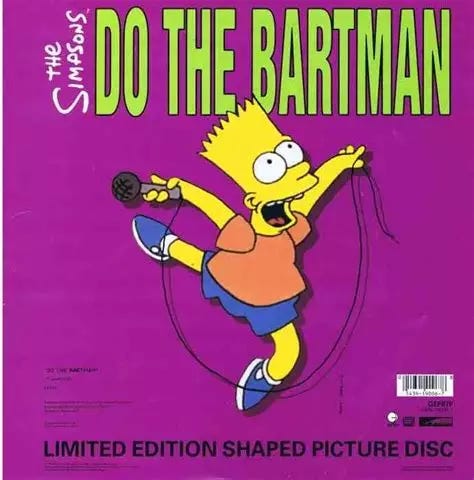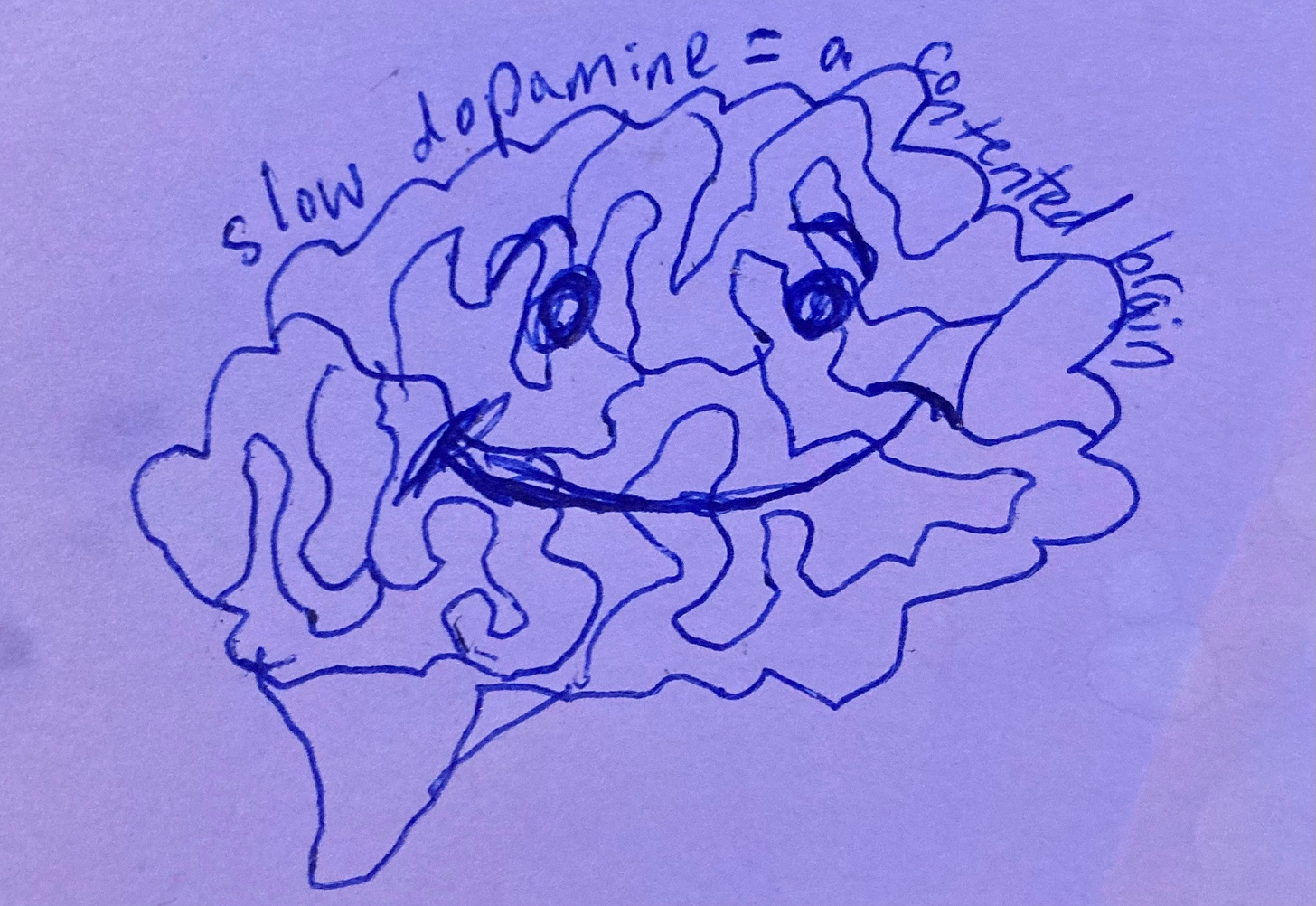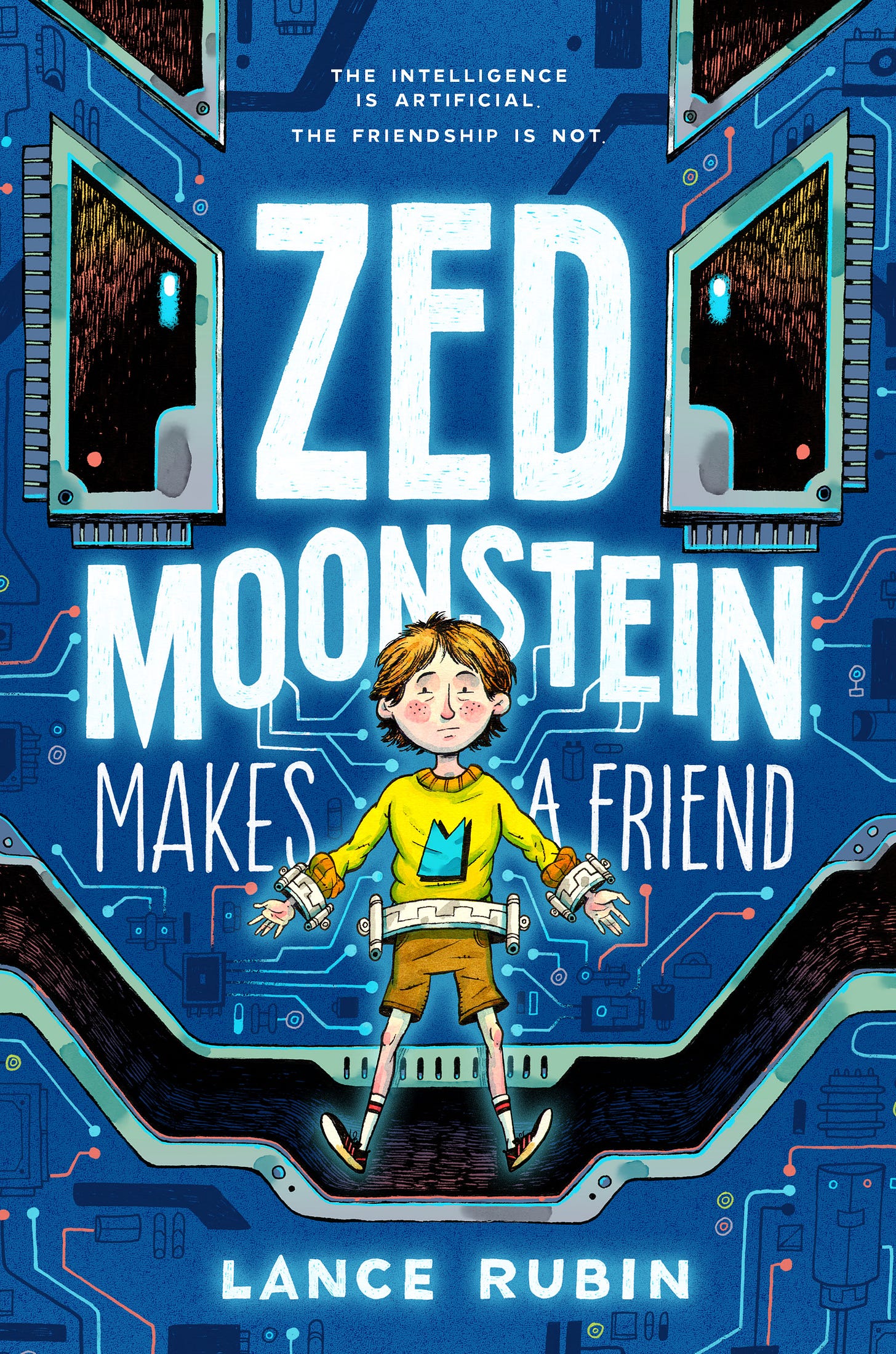Yo! Hey what’s happening, dude? I’m a guy with a rep for being rude.
One hundred points if you know that was not just a greeting but also the opening lyrics of “Do the Bartman,” the 1990 hit single from the album The Simpsons Sing the Blues. I dug up my cassette tape several years ago from my parents’ house, so now my kids, age 11 and 7, sometimes listen to it on our tape player. (They also enjoy the Mr. Burns/Smithers duet, “Look At All Those Idiots!”)
Couldn’t my kids have found the song on YouTube? Of course. And, once I informed them the song had a music video, they did (accompanied by Katie’s and my new go-to line when they veer anywhere near an infinite scroll: “We’re just watching that one thing, okay?”)
But I desperately want our kids to have a relationship with physical media. (See: my nostalgia for video stores.) I want them to experience the simple pleasure that comes with making a thoughtful and deliberate decision about a single piece of music they want to listen to, a single film they want to watch. I know we can’t rewind technological progress, but we can offer alternatives that don’t involve crowding our brains every minute of the day with ALL the options.
I remember taping “Do the Bartman” off the radio before the album came out. I would play a section at a time, methodically transcribing the lyrics onto paper. Since I’m not someone who naturally absorbs and memorizes song lyrics (like my wife), this was the easiest way for me to learn them. And guess what? I still remember a ton of those lyrics today. The same goes for Kriss Kross’s “Jump.” Don’t try to compare us to another bad little fad, I’m the mack, and I’m bad, give you something that you never had.
Now honestly, what does it matter if a kid transcribes the lyrics or just searches them out online? I don’t know. But there’s something about learning to strive for things you want that I think does matter. Learning to tolerate the discomfort of not instantly having your needs met. In a time when magical apps exist for pretty much everything, I understand why today’s kids assume that anything they want should be handled with a push of a button.
I don’t like it, though! Some of the deepest rewards I’ve experienced have come from working hard to accomplish something.
Which brings us to our exciting new friend, A.I.
Perhaps you’ve seen a commercial (or eighty) about it? All the ways A.I. is going to help us and future generations strive even less than we already do?
I know that’s a gross over-simplification, and I know there have been/will be many good things that result from A.I.: medical breakthroughs, lives saved, more efficient systems of using resources (to help counteract the heinous amounts of water and energy A.I. gobbles up in order to function in the first place).
But lately, all I can see when it comes to A.I. is the bad. I—along with pretty much every author I know—have learned that our books have been fed into large-language-models (LLMs) by Meta, OpenAI, and others. Now A.I. will be able to spit out “books” without needing to pay any of us pesky authors! (It’s a surreal moment for American authors, with corporations trying to steal our books, while governments at all levels try to ban them, but that’s a subject for another time.)
The same kind of foreboding news is present in all creative industries, including voiceover.
And it’s present in the academic world, too! Katie teaches English to college first-years, and this semester, she’s seen more A.I.-written essays than ever. The most obvious tell is that these essays, while claiming to cite works that Katie has assigned, feature made-up quotes that can’t be found anywhere in those pieces.
And it’s not just Katie who’s experiencing this. This New York article about college students using ChatGPT is a wild read. It’s depressing and terrifying, but I think it’s important for everyone to be aware of what’s going on out there.
Here’s a quote from a student named Sarah I found particularly haunting:
Very cool! How could there possibly be an anxiety epidemic when everything is going this well!
It feels like we’re doing our kids a shocking disservice by not working harder to put up A.I. guardrails. Not only are we depriving them of the feeling of accomplishment, but we’re also severely limiting their future abilities. As Lakshya Jain, a lecturer at UC-Berkeley, tells his students:
And guess what? Apparently some professors are using ChatGPT too. Robots grading robots!
But if all this leaves you unfazed, I encourage you to read this astounding NYTimes article about the increasing level of A.I. hallucinations aka WHEN THE ROBOT MAKES STUFF UP. People are treating A.I. as if it’s a reliable search engine, and it’s not. Katie discovered this piece and, deeply affirmed, read much of it aloud to me before proceeding to read the entire thing aloud to all of her students.
Here’s a fun quote:
Oh, so you mean A.I. will ALWAYS MAKE STUFF UP? Super! Seems like a great foundation for a stable future filled with very smart people.
My last strong recommendation is this excellent 15-minute TED talk by Tristan Harris. You may remember him from the 2020 Netflix doc The Social Dilemma—he left his job as a Google Design Ethicist to co-found the Center for Humane Tech.
In his talk, he argues that this line of thinking we all fall back on, that “A.I. is inevitable” so there’s nothing we can do to reduce the harm it might cause, is insane.
According to him, the first step is establishing a collective clarity on the immense damage that can result from allowing tech companies to move forward unregulated, recklessly racing for profit.
After we do that, we can work together to carve a path that allows us to benefit from A.I. while making sure we don’t, uh, completely ruin society.
“There is no room of adults working secretly to make sure that this turns out okay,” Tristan says. “We are the adults. We have to be.”
All of it’s pretty scary. But his talk is also inspiring. The first step in solving a problem is acknowledging that there is a problem. And I think it’s impossible to watch this talk and read these articles without conceding Yes, we definitely have a problem.
So let’s be the adults. The next time A.I. comes up in conversation, mention these articles. Mention your concerns. Spread the word. I know there’s a ton for us to be calling our reps about right now, but this should be on the list too.
In fact, it’s overtly political. On Sunday night, the GOP snuck in language to the Budget Reconciliation bill saying that A.I. can’t be regulated by the states for the next ten years. This would make any existing or proposed laws protecting people from A.I. impossible to enforce and would also prevent any new legislation from being passed.
Profit over people seems to be the current vibe right now.
But it doesn’t mean we can’t win some of these battles.
Let’s work together. Let’s strive for change. Let’s tape the proverbial song off the radio and methodically transcribe the lyrics.
I promise it will feel better than just tapping a button.
Thank you as always for being here. If you were inspired by any part of this piece and want your kid to be entertained and inspired too, consider pre-ordering my Middle Grade A.I. comedic thriller, Zed Moonstein Makes a Friend!
“A funny, kid-perfect glimpse into a near-future that’s probably already here.” — Gordon Korman, New York Times Bestselling Author of The Unteachables
“A propulsive friendship thriller, a funny, connective character story, and a warning about the future all rolled into one—Zed Moonstein Makes a Friend is a book you can’t put down and can’t stop thinking about once it’s over. My heart is still racing from this captivating, clever, and deeply human book.” — Corey Ann Haydu, author of One Jar of Magic and Eventown
“This imaginative and achingly well-observed novel cleverly speculates about how tech companies could profit from the anxiety around middle school friendships. Zed Moonstein Makes a Friend is hilarious, insightful, and more than a little scary.” — Eliot Schrefer, New York Times-bestselling author of the Lost Rainforest series
Also, I’m actively booking Zed Moonstein school visits for grades 4-7 for the 2025-26 school year. Please reach out if you’re interested!
In other news, after an enthusiastic nudge from my buddy Rich, Katie and I saw Sinners last week, and it was fantastic. It’s a brilliantly-made vampire movie with so much to say about America and race and exploitation. All the creative elements are working together in the most beautiful way, including the spectacular music. Really loved it. Go see it in the theater! You’ll be glad you did.
Also: GO KNICKS. If you haven’t been following their instantly legendary series with the Boston Celtics, you should. Knicks are currently up 3-2, with the next game Friday night at MSG. It’s the kind of series that reminds you nothing is predictable and seemingly impossible things can happen all the time. A good reminder right now.








The admin at our school is using AI to write our teacher evaluations, and I was like: WHAAAAAT? Like, it's your job to think, understand, and evaluate what I'm doing in my classes. What a fiasco.
Thank you for sounding the alarm on AI and the lack of the current administration to even try to rein in the tech bros. Biden administration tried to. Zuckerberg has said everyone should have at least 15 friends. So if you're on the short side of that made-up number, what harm is an AI friend or 12? This is already happening with many kids.
When I worked at Bell Labs 50 years ago, there was a software program circulating called Eliza which mimicked a therapist. It was uncannily good way back then by parroting back what you said, and asking a follow-on question. It couldn't hallucinate because the algorithm was so limited. AI is infinitely more sophisticated and infinitely more dangerous. I would not trust it with a depressed teen with suicidal thoughts, yet here we are. It's free, have at it.